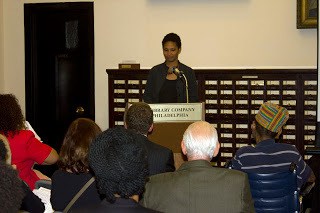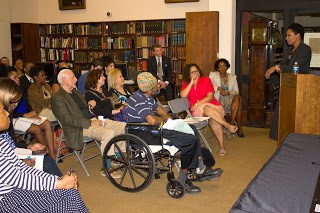2015 Juneteenth Freedom Symposium with Dr. Danielle Allen
 The Program in African American History (PAAH) welcomed political theorist Dr. Danielle Allen for our annual Juneteenth Freedom Symposium on June 18. PAAH hosts an annual symposium to recognize Juneteenth, one of the oldest known celebrations commemorating the end of slavery in the United States. This year’s theme focused on the enduring importance of democratic ideals to confront the social justice challenges of our time.
The Program in African American History (PAAH) welcomed political theorist Dr. Danielle Allen for our annual Juneteenth Freedom Symposium on June 18. PAAH hosts an annual symposium to recognize Juneteenth, one of the oldest known celebrations commemorating the end of slavery in the United States. This year’s theme focused on the enduring importance of democratic ideals to confront the social justice challenges of our time. Thus, Allen argued that the Declaration empowers Americans to create a government and political system that will address civil rights issues. Prime among these in the present day is the mass incarceration of African Americans. Allen also presented troubling statistics which demonstrated that African American children begin facing disproportionate rates of suspension in pre-school. These numbers reveal how “destructive” the current form of government is by denying black children their unalienable rights and setting them on a disenfranchised path to prison. Allen posited that the radical spirit of the Declaration provides the basis for altering our discriminatory criminal justice system through revolutionary measures. Allen offered one further thought for consideration: decriminalizing non-violent drug offenses.
Thus, Allen argued that the Declaration empowers Americans to create a government and political system that will address civil rights issues. Prime among these in the present day is the mass incarceration of African Americans. Allen also presented troubling statistics which demonstrated that African American children begin facing disproportionate rates of suspension in pre-school. These numbers reveal how “destructive” the current form of government is by denying black children their unalienable rights and setting them on a disenfranchised path to prison. Allen posited that the radical spirit of the Declaration provides the basis for altering our discriminatory criminal justice system through revolutionary measures. Allen offered one further thought for consideration: decriminalizing non-violent drug offenses. 
Leave a Reply
Want to join the discussion?Feel free to contribute!